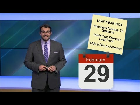
.. Pope Gregory XIII who saw the problem .. and an opportunity to SKIP TEN DAYS that year (1582), in October, and just that year, to get back in line ..
(youtu.be)
🧘Mental/Physical Health 🏋🏼♂️
New years used to me April 1.
Those who continued to celebrate it, were called April fools.
Recent internet jokes aside, ancient Roman spring festival of pranks and jesters called Hilaria, on verbal equinox, and Chaucer also made reference to the pranking of innocents, or fools, on Match 32, being first of April. Chaucer wrote in the late 1300s, before the Gregorian calendar adjustment. On paper. Still completely unconnected with actual life, which rusted around crops and hunting. From the perspective of land- and weather-dependent people, a paper change like that would have seemed very foolish. Although the "learned" men of the cities surely believed that the rubes in rural places that raised their food surely were fools.
10 days darkness
1582: The Year Of Confusion. Julius Caesar (in 46 BC) made a year much longer than 365 days and then tried to make an adjustment moving forward. The problem (was that) this was an overestimation still. By the 1500s it was very clear that the calendar was not lined up. And this was Pope Gregory XIII who saw the problem .. and an opportunity to SKIP TEN DAYS that year (1582), in October, and just that year, to get back in line with the Seasons. After making that change, we followed the Gregorian calendar.